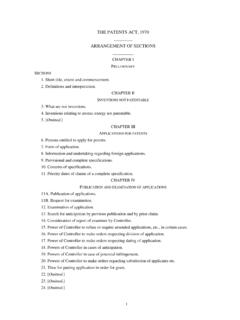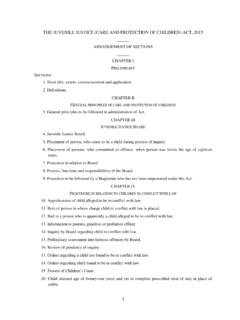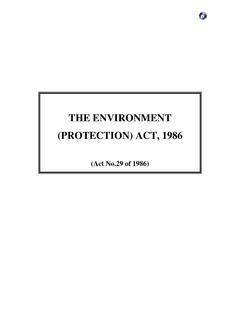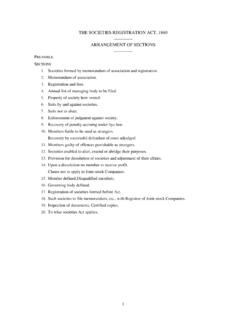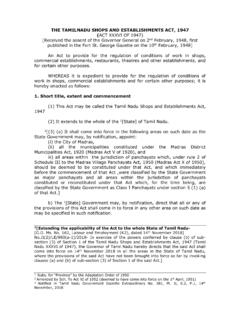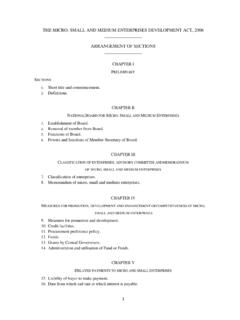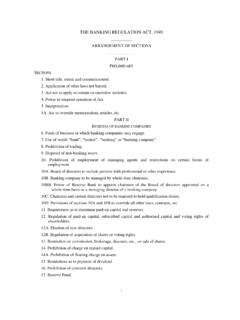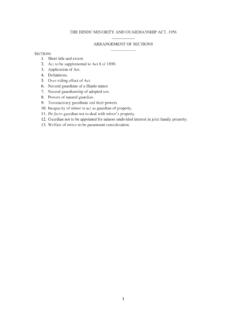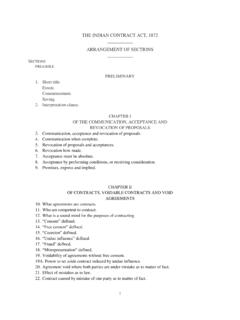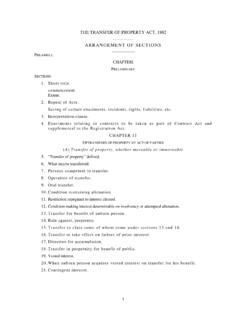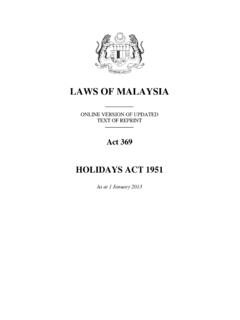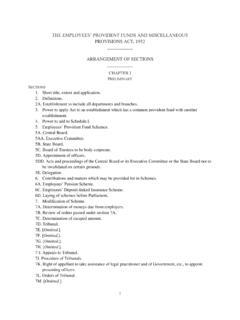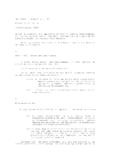Transcription of THE PREVENTION OF CORRUPTION ACT, 1988 - India Code
1 1 THE PREVENTION OF CORRUPTION ACT, 1988 _____ ARRANGEMENT OF SECTIONS _____ CHAPTER I PRELIMINARY SECTIONS 1. Short title and extent. 2. Definitions. CHAPTER II APPOINTMENT OF SPECIAL JUDGES 3. Power to appoint special Judges. 4. Cases triable by special Judges. 5. Procedure and powers of special Judge. 6. Power to try summarily. CHAPTER III OFFENCES AND PENALTIES 7. Offence relating to public servant being bribed. 7A. Taking undue advantage to influence public servant by corrupt or illegal means or by exercise of personal influence. 8. Offence relating to bribing of a public servant. 9. Offence relating to bribing a public servant by a commercial organisation.
2 10. Person in charge of commercial organisation to be guilty of offence. 11. Public servant obtaining undue advantage, without consideration from person concerned in proceeding or business transacted by such public servant. 12. Punishment for abetment of offences. 13. Criminal misconduct by a public servant. 14. Punishment for habitual offender. 15. Punishment for attempt. 16. Matters to be taken into consideration for fixing fine. CHAPTER IV INVESTIGATION INTO CASES UNDER THE ACT 17. Persons authorised to investigate. 17A. Enquiry or Inquiry or investigation of offences relatable to recommendations made or decision taken by public servant in discharge of official functions or duties.
3 18. Power to inspect bankers books. CHAPTER IV A ATTACHMENT AND FORFEITURE OF PROPERTY 18A. Provisions of Criminal Law Amendment Ordinance, 1944 to apply to attachment under this Act. 2 CHAPTER V SANCTION FOR PROSECUTION AND OTHER MISCELLANEOUS PROVISIONS SECTIONS 19. Previous sanction necessary for prosecution. 20. Presumption where public servant accepts any undue advantage. 21. Accused person to be a competent witness. 22. The Code of Criminal Procedure, 1973 to apply subject to certain modifications. 23. Particulars in a charge in relation to an offence under section 13 (1) (a). 24. [Omitted.] 25. Military, Naval and Air Force or other law not to be affected.
4 26. Special Judges appointed under Act 46 of 1952 to be special Judges appointed under this Act. 27. Appeal and revision. 28. Act to be in addition to any other law. 29. Amendment of the Ordinance 38 of 1944. 29A. Power to make rules. 30. Repeal and saving. 31. [Repealed.] 3 THE PREVENTION OF CORRUPTION ACT, 1988 ACT NO. 49 OF 1988 [9th September, 1988.] An Act to consolidate and amend the law relating to the PREVENTION of CORRUPTION and for matters connected therewith. BE it enacted by Parliament in the Thirty-ninth Year of the Republic of India as follows: CHAPTER I PRELIMINARY 1. Short title and extent. (1) This Act may be called the PREVENTION of CORRUPTION Act, 1988.
5 (2) It extends to the whole of India 1** and it applies also to all citizens of India outside India . 2. Definitions. In this Act, unless the context otherwise requires, (a) election means any election, by whatever means held under any law for the purpose of selecting members of Parliament or of any Legislature, local authority or other public authority; 2[(aa) prescribed means prescribed by rules made under this Act and the expression prescribe shall be construed accordingly;] (b) public duty means a duty in the discharge of which the State, the public or the community at large has an interest; Explanation.
6 In this clause State includes a corporation established by or under a Central, Provincial or State Act, or an authority or a body owned or controlled or aided by the Government or a Government company as defined in section 617 of the Companies Act, 1956 (1 of 1956); (c) public servant means (i) any person in the service or pay of the Government or remunerated by the Government by fees or commission for the performance of any public duty; (ii) any person in the service or pay of a local authority; (iii) any person in the service or pay of a corporation established by or under a Central, Provincial or State Act, or an authority or a body owned or controlled or aided by the Government or a Government company as defined in section 617 of the Companies Act, 1956 (1 of 1956); (iv) any Judge, including any person empowered by law to discharge, whether by himself or as a member of any body of persons, any adjudicatory functions.
7 (v) any person authorised by a court of justice to perform any duty, in connection with the administration of justice, including a liquidator, receiver or commissioner appointed by such court; (vi) any arbitrator or other person to whom any cause or matter has been referred for decision or report by a court of justice or by a competent public authority; (vii) any person who holds an office by virtue of which he is empowered to prepare, publish, maintain or revise an electoral roll or to conduct an election or part of an election; (viii) any person who holds an office by virtue of which he is authorised or required to perform any public duty; (ix) any person who is the president, secretary or other office-bearer of a registered co-operative society engaged in agriculture, industry, trade or banking, receiving or having received any financial aid from the Central Government or a State Government or from any 1.
8 The words except the State of Jammu and Kashmir omitted by Act 34 of 2019, s. 95 and the Fifth Schedule ( 31-10-2019). 2. Ins. by Act 16 of 2018, s. 2 ( 26-7-2018). 4 corporation established by or under a Central, Provincial or State Act, or any authority or body owned or controlled or aided by the Government or a Government company as defined in section 617 of the Companies Act, 1956 (1 of 1956); (x) any person who is a chairman, member or employee of any Service Commission or Board, by whatever name called, or a member of any selection committee appointed by such Commission or Board for the conduct of any examination or making any selection on behalf of such Commission or Board.
9 (xi) any person who is a Vice-Chancellor or member of any governing body, professor, reader, lecturer or any other teacher or employee, by whatever designation called, of any University and any person whose services have been availed of by a University or any other public authority in connection with holding or conducting examinations; (xii) any person who is an office-bearer or an employee of an educational, scientific, social, cultural or other institution, in whatever manner established, receiving or having received any financial assistance from the Central Government or any State Government, or local or other public authority.
10 1[(d) undue advantage means any gratification whatever, other than legal remuneration. Explanation. For the purposes of this clause, (a) the word gratification is not limited to pecuniary gratifications or to gratifications estimable in money; (b) the expression legal remuneration is not restricted to remuneration paid to a public servant, but includes all remuneration which he is permitted by the Government or the organisation, which he serves, to receive.] Explanation 1. Persons falling under any of the above sub-clauses are public servants, whether appointed by the Government or not. Explanation 2. Wherever the words public servant occur, they shall be understood of every person who is in actual possession of the situation of a public servant, whatever legal defect there may be in his right to hold that situation.
